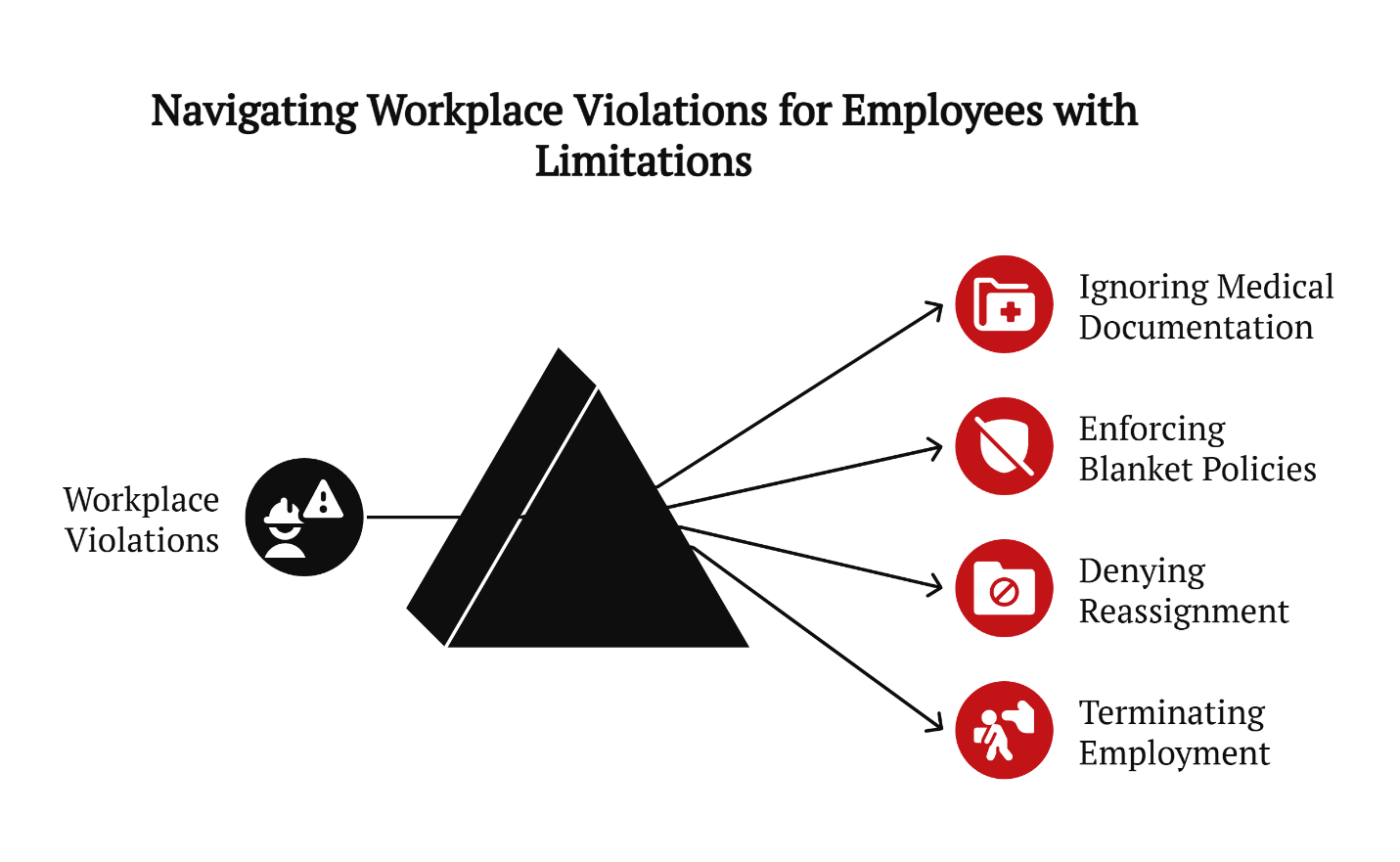📌 Key Takeaways
When an employer ignores disability accommodation laws, knowledge and decisive action can protect your rights.
Spot Early Warning Signs: Lack of response, delays, or superficial engagement after a disability disclosure often signals non-compliance with FEHA.
Know the Legal Standard: California law, including CCR §11065(p), requires timely, good-faith communication between employer and employee to identify reasonable accommodations.
Identify Common Failures: Blanket policy disqualifications, denial without undue hardship analysis, and premature termination of discussions can indicate unlawful conduct.
Document Everything: Maintain detailed records of all requests, responses, and medical documentation to support a potential legal claim.
Seek Immediate Legal Review: Contact an employment law attorney promptly to evaluate whether your employer’s actions violate FEHA requirements.
Empowered awareness and swift consultation can be the difference between unaddressed harm and effective legal protection.
When a California employee discloses a disability to an employer, the Fair Employment and Housing Act (FEHA) requires that the employer engage in a timely, good-faith “interactive process” to explore reasonable accommodations. Under California law, including California Government Code § 12940 and California Code of Regulations, Title 2, § 11065(p), this process is a legally mandated, collaborative discussion. Section 11065(p) defines it as timely, interactive communication between employer and employee to identify effective reasonable accommodations — a standard all California employers must follow.
Unfortunately, some employers fail to meet these obligations, resulting in situations that may require legal review. If you have concerns about your employer’s compliance, contact an employment law attorney to evaluate your case. Experiencing barriers to accommodations can be stressful and isolating, and professional guidance can help protect your rights.
Recognizing When Employers Violate California Law
Certain patterns may indicate an employer is not fulfilling FEHA’s interactive process requirements:
- No response to a documented disability disclosure such as back injury.
- Ignoring or delaying accommodation requests without valid reason.
- Unilateral decisions about work restrictions without discussion.
- Superficial acknowledgment of requests without genuine engagement.
These scenarios may suggest potential violations. Whether they rise to actionable claims depends on the specific facts and context, which should be reviewed by a qualified attorney.
Example (for illustration only): An employee provides medical documentation requiring reduced lifting duties. The employer neither responds nor discusses alternatives and later assigns tasks that exceed the restriction. This could indicate a failure to engage in the interactive process.
Employer Legal Obligations Under FEHA

California Government Code § 12940 outlines specific prohibitions against disability discrimination and mandates that employers engage in the interactive process when an employee requests accommodation. CCR Title 2, § 11065(p) emphasizes that the process must be timely and conducted in good faith, with active participation by both employer and employee.
Common violations include:
- Treating accommodation discussions as optional.
- Workplace policies that discourage disability disclosure.
- Shifting the burden entirely onto the employee to identify accommodations.
- Denying requests without analyzing whether they cause undue hardship (defined as significant difficulty or expense).
Determining whether an employer’s conduct breaches these standards requires fact-specific legal evaluation.
Patterns That May Constitute FEHA Violations
Employers who engage in the following behaviors may be at risk of violating FEHA:
- Documented refusal to engage in accommodation discussions.
- Retaliatory behavior following a disability disclosure.
- Prematurely ending discussions about possible accommodations.
- Failing to explore obvious or low-cost accommodation options.
Industry sectors such as manufacturing, construction, healthcare, and warehousing present higher risks for such violations, particularly when the disability involves a back injury or physical limitation.
Verification Note: Each case must be assessed individually, as workplace contexts and medical limitations vary.
Workplace Violations Affecting Employees with Physical Limitations

Back injuries often require accommodations like ergonomic adjustments, reassignment, or modified schedules. Examples of potential violations include:
- Ignoring valid medical documentation of physical restrictions.
- Enforcing blanket policies disqualifying employees with lifting restrictions.
- Denying reassignment to vacant positions for which the employee is qualified.
- Terminating employment without exploring feasible modifications.
Employees experiencing these issues should maintain detailed records of all communications with their employer. Documentation may help an attorney assess whether the conduct meets FEHA’s legal threshold for violation.
FEHA Requirements and Violation Thresholds
Under FEHA, employers may only deny accommodations if they can demonstrate undue hardship. Generalized concerns, such as potential inconvenience or minor cost, are not sufficient under the law.
Employers who claim undue hardship without proper analysis, or who use vague business justifications, risk violating FEHA. Because these determinations are fact-intensive, professional legal review is essential.
Why Professional Legal Consultation Is Essential
The interactive process involves legal standards, statutory duties, and documentation requirements that are complex and highly fact-dependent. Consultation with an experienced employment law attorney is critical to:
- Assess whether your employer’s actions meet or violate FEHA obligations.
- Evaluate whether accommodation denial constitutes unlawful discrimination.
- Determine the best course of action under the law based on your circumstances.
Contact an attorney promptly if you suspect your employer has failed to follow California’s interactive process requirements.
For the most accurate and current legal text, refer to:
Disclaimer:
This content is for informational purposes only. This content is not legal advice. No attorney-client relationship is formed through this content. Please consult a qualified attorney in your jurisdiction for legal advice specific to your situation.
Protect Your Rights | The Akopyan Law Firm, A.P.C. | Top Gun Employment Lawyers
Have you been wrongfully terminated from your job? Have you suffered discrimination, harassment, or retaliation in the workplace? Has your employer violated wage and hour laws? If so, we can help. The Akopyan Law Firm, A.P.C. is dedicated to protecting and enforcing employees’ rights throughout Southern California. With a 97% success rate and millions recovered for our clients, our team of experienced and talented employment lawyers can fight to secure the justice you deserve.
Take the First Step Towards Securing Justice: Call us today to speak with one of our experienced employment lawyers. The firm offers case evaluations free of charge.
Contact Us Today:
- Phone: (818) 509-9975
- Office Locations: Los Angeles, Bakersfield, Costa Mesa, Temecula, Rancho Cucamonga, Oxnard, Culver City, and San Diego in California.
Important: Contacting the Akopyan Law Firm, A.P.C. does not create an attorney-client relationship, but all communications will remain private and confidential. Each case is unique. The Akopyan Law Firm, A.P.C., does not guarantee any outcome.

